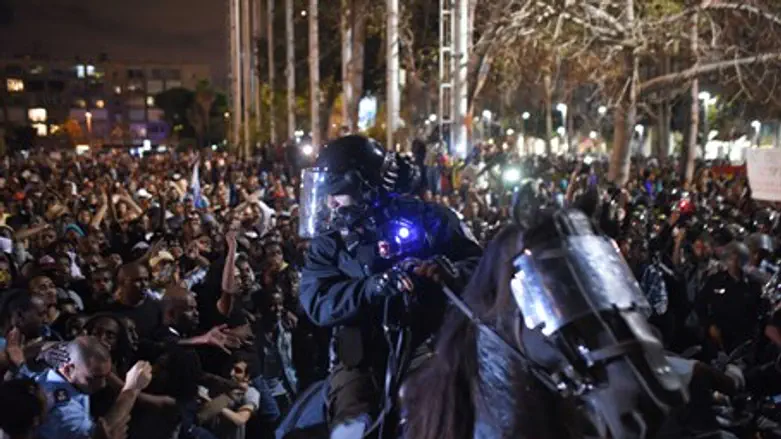
Members of the Ethiopian-Jewish community plan to hold what they say will be their largest protest to date Monday afternoon, near the Azrieli Towers in Tel Aviv.
The protesters will demand that the Attorney General reverse last week's decision not to file charges against the policeman who beat up an Ethiopian soldier, Damas Pakada, in an incident captured on security camera video.
The protest's motto will be – “I Have No Other Country, Even if Racism is Burning,” a slogan based on the first line from a famous song sung by Corrine Alal. Unlike Ethiopian Jews' protests last month – which included illegal actions like blocking of major thoroughfares, and which turned violent – this demonstration has been licensed by the police.
Gadi Yevarkan, director of the Center for Social Equality for Ethiopian Jews, told Channel 1 television Sunday that Israel's legal and law enforcement authorities have consistently discriminated against Ethiopian Jews, in numerous cases.
He added that the protesters will demand that a commission of inquiry be established, to look into the large number of cases in which Ethiopian Jewish youths are unjustly charged with attacking police officers, when in fact it is the police who are the attackers.
Yevarkan said that the protesters see Israel as their home and have no interest in seeing it depicted abroad as a racist society.
What does the video show?
Attorney General Yehuda Weinstein decided last week to accept the recommendation of the Police Internal Investigations Department to discontinue the proceedings against the officer, transferring the case to police for a "disciplinary examination" of his conduct, the ministry said.
The investigation was launched when a video emerged late April showing an Israeli soldier of Ethiopian origin on his bike approaching two police who were blocking a road.
After a short verbal exchange between the two, one of the officers is seen hitting the soldier, later identified as Damas Pakada, who fought back and was eventually subdued and handcuffed.
The footage set off a series of demonstrations across the country, including one in Tel Aviv during which police used riot control means and detained dozens of protesters, some of whom threw stones and bottles.
The incident also pushed Israel's leadership to pledge action to fix the "mistakes" made in the absorption of the country's 135,000-strong Ethiopian Jewish community, some of whom say they suffer racism and discrimination.
Weinstein explained that a thorough examination of the video materials proved Pakada was the first to act violently when he pushed the officer barring his passageway.
"The officer used force to distance the soldier from the spot," the statement said, noting the chain of mutual violence which led to the eventual arrest of Pakada by the officer and another policeman at the site, which was "conducted flawlessly."
Weinstein added he was also closing the investigation against Pakada for attacking the officer.
The officer had been fired from the police shortly after the incident.